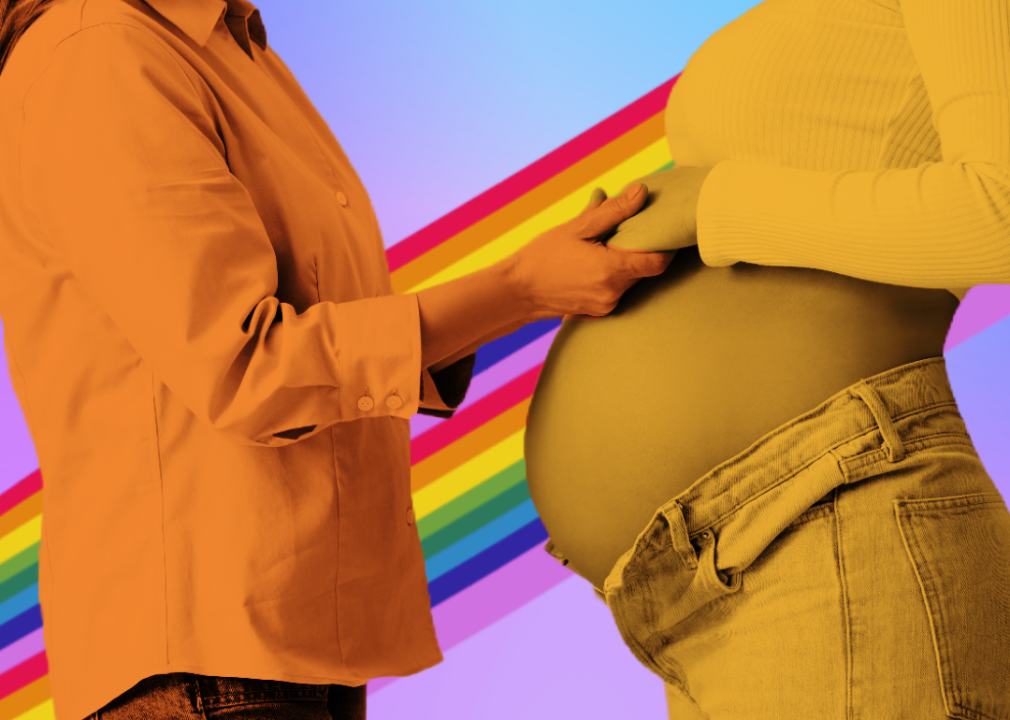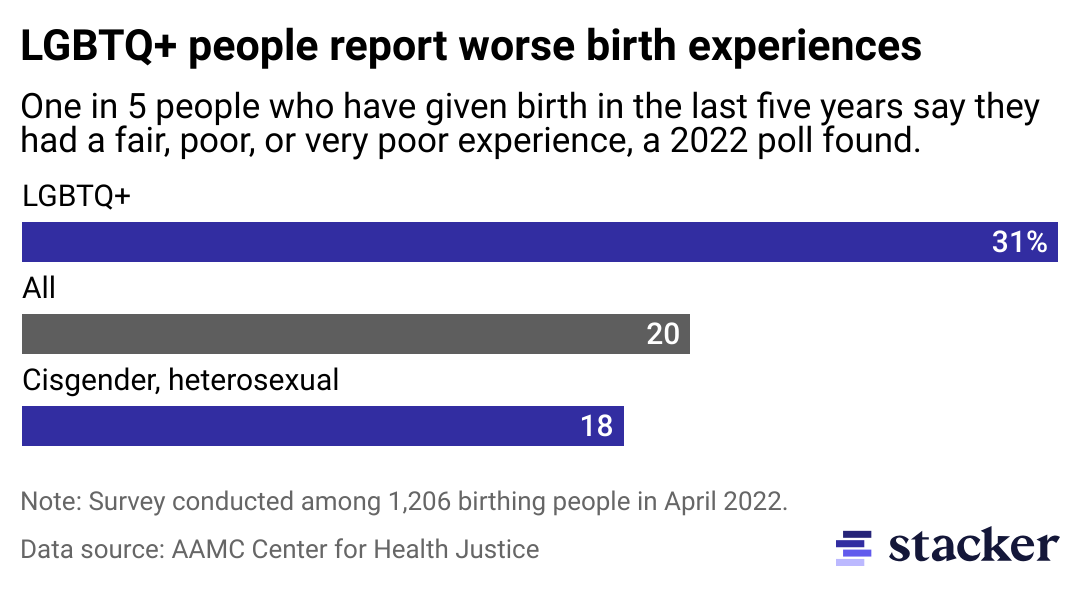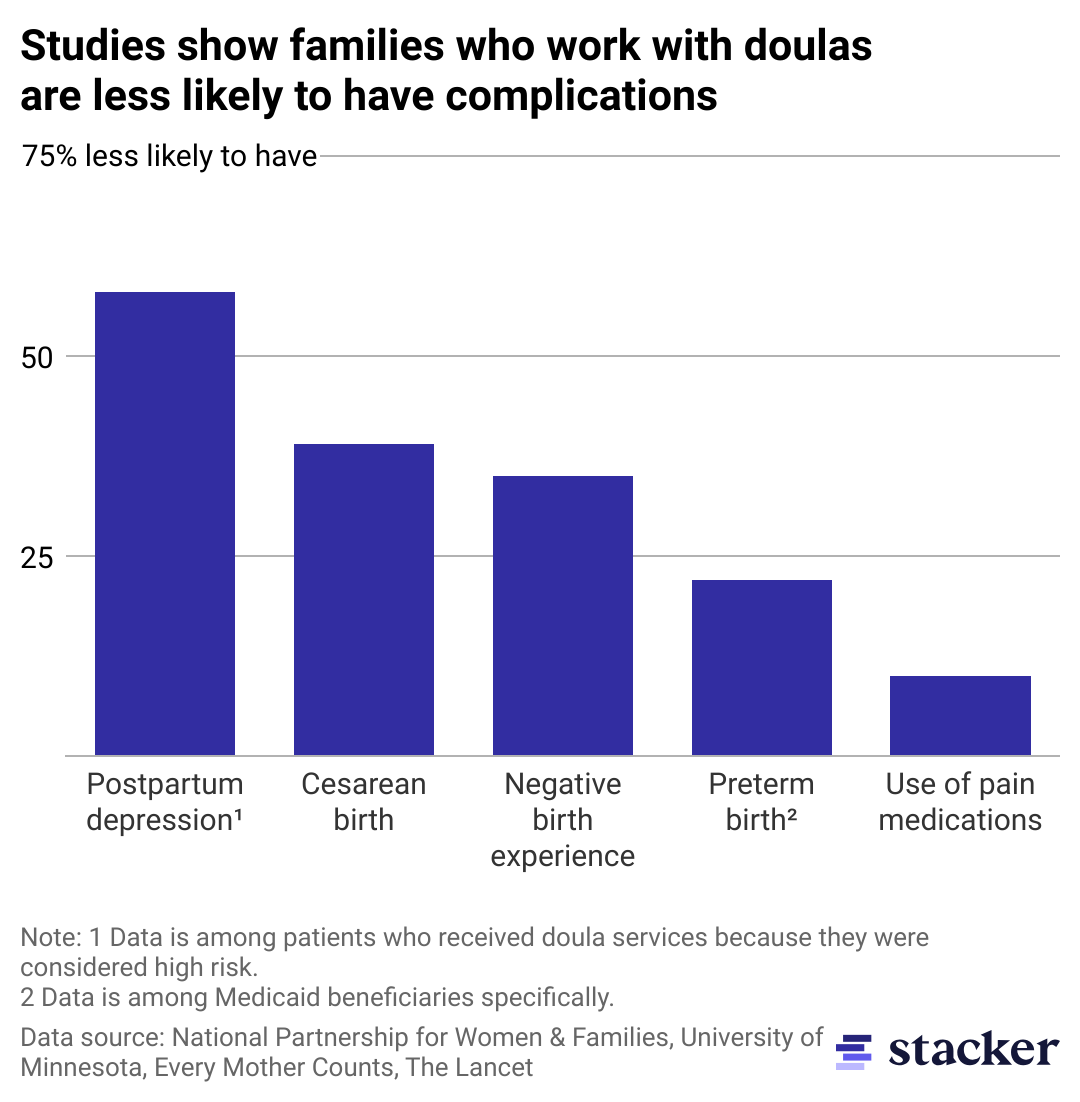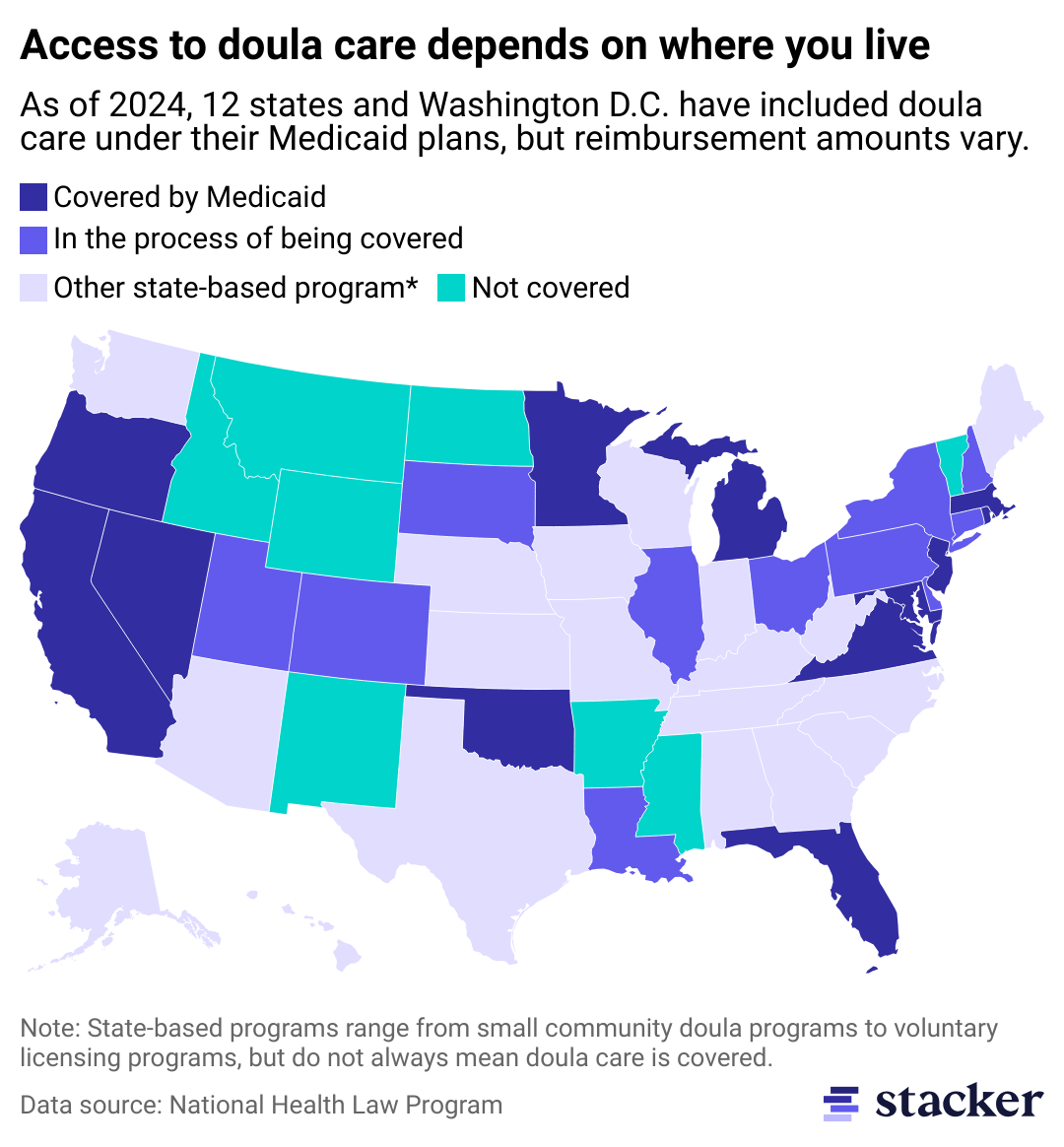Queer doulas make childbirth safer for Black, brown, and LGBTQ+ people, but barriers remain

"You're pretty much the plaster that goes over the cracks of the medical system."
That's how Bonnie Silva, a full-spectrum doula based in New York City, describes the role of doulas and birth workers. For many people who are pregnant or have just given birth, the landscape of unknowns—the changes to one's body, what the labor process will look like, and what happens after—can be daunting.
The medical system, with all of its cracks, doesn't always prepare new parents for the physical and emotional toll of pregnancy and birth. "Doctors are very quick," Silva told Stacker. "They don't take a lot of time with their patients. And patients, a lot of times, don't know what to ask."
That's where doulas come in. Doulas are nonmedical care workers who assist people throughout the pregnancy, birth, and postpartum processes by providing education, emotional, physical, and logistical support, as well as advocacy within medical settings. Full-spectrum doulas offer support for everything from preconception to miscarriage, abortion, and adoption. Doulas differ from midwives in that they do not necessarily have medical training and generally work outside of the medical system. Doulas can, however, act as intermediaries between patients and doctors.
Stacker spoke with doulas, researchers, health care advocates, and educators about the work doulas and birth workers are doing to uplift their communities and make giving birth safer for everyone.
Amid a worsening maternal health crisis, an increased interest in doula care has put doulas and birth workers on the map, increasing awareness among people who had perhaps never heard of them before. But doulas have a long and vital history of supporting pregnancy and birth in communities that have been marginalized by the medical system and even predate hospital births.
The legacy of Black birth workers like granny midwives—who guided the births of thousands of women within their communities from the 1600s until they were forced out of practice by the emerging medical profession in the mid-1800s—remains strong today. For Black and Indigenous families, the LGBTQ+ community, and low-income individuals, who all too frequently fall through the cracks of the health care system, doulas can provide potentially life-saving care.


Pregnancy and birth can be scarier for LGBTQ+ people and people of color
Little data exists on the pregnancy and birth experiences of LGBTQ+ people. One study of bisexual and lesbian women published in 2019 by the Maternal and Child Health Journal found higher rates of miscarriage and premature births compared to heterosexual women, pointing to sexual orientation inequities in birth and pregnancy outcomes.
Trans and gender-nonconforming parents face additional disparities, according to Alexis Robles-Fradet, a policy analyst at the National Health Law Program.
"There's more reported harassment," Robles-Fradet told Stacker. "[There are] more folks that just don't know how to care for trans people, even if they have good intentions and aren't being outright discriminatory."
In addition to dealing with health care providers that often lack expertise on trans health care, transgender and gender-nonconforming birthing people have reported feelings of loneliness and of their experiences of parenting being erased within a health care system built on a binary understanding of gender, anatomy, and parenthood.
For Black and Latina lesbian and bisexual women, birth and pregnancy outcomes are worse than those of their white counterparts, according to another study published in 2021 in the Journal of Health and Social Behavior. This finding lines up with broader racial inequities in birth and pregnancy outcomes, as well as much higher maternal mortality rates among Black and Indigenous women than white women.
Doulas often see these disparate experiences firsthand. Silva, who is Latina and queer, was accompanying a Black client at her birth in a New York City hospital around 2018 and witnessed a nurse ignoring her client's request for an epidural.
"There was this one moment specifically that I remember where the nurse kind of held my patient down on the bed and said, 'You're not in pain. You're just exaggerating,'" Silva recalled.
That was Silva's cue to intervene. "I literally looked at her and I said, 'Take your hands off my client right now. You're being completely inappropriate.'"
This incident is far from an anomaly within the medical system: The systemic dismissal and undertreatment of Black patients' pain by doctors and other medical professionals is a well-documented phenomenon rooted in racist and pseudoscientific beliefs that Black people are less sensitive to pain than white people.
These kinds of experiences can lead to fear and distrust of medical environments. A few years ago, Annie Rosenblum, a white queer full-spectrum doula and abortion worker living in Gainesville, Florida, was driving a client to deliver their baby at a local hospital known for its high maternal and infant mortality rates, particularly among Black and brown patients. Rosenblum remembers their client, who is Black and queer, turning to them in the car and saying, "Don't let them kill me."
Experiences of discrimination and marginalization within medical settings can touch both the person giving birth as well as their accompanying doula. "I have been in situations where my clients are being discriminated against, and I've been in situations where I'm being discriminated against because I am Black," Sabia Wade, a full-spectrum doula and educator based outside Atlanta, told Stacker.
Wade's ability to understand her clients' experiences is an example of the ways in which doulas can be crucial supports in the moments when it matters most: as a humanizing and comforting presence for the person giving birth but also as an active advocate and intervenor. From early on in her doula training, Wade has been hyperaware of this role. "How do you also protect and advocate for someone who other people may not deem as valuable?" she said.

Doulas can be invaluable advocates and educators for people overlooked by the medical system
Studies have shown that birthing people who were assisted by a doula had fewer birth complications and were less likely to have a low birth weight baby. Doula assistance has also been linked to a lower likelihood of premature and cesarean births.
Some of these positive outcomes may be traced back to the role of doulas as educators. For Wade, teaching clients about what to expect at every stage of the process—from pregnancy to postpartum—is a means of empowering birthing people to be more in control of their experiences.
Aside from educating clients about what will happen to their bodies as they give birth and the types of procedures and examinations they should expect, a critical part of being a doula, to Wade, is reminding clients that they have agency within medical settings that can be fast-moving at best and dehumanizing at worst.
"Doulas come in and say, 'Hey, I'm going to care for those parts that the system doesn't recognize. I'm going to teach you how to advocate for yourself in a system that doesn't necessarily have space for you built in the foundation,'" Wade said.
Doulas serve as advocates, slowing down doctors and nurses when necessary and checking in with clients to make sure they're okay with what's happening. Wade said she likes to remind her clients, "Just because a process goes this way doesn't mean that you have to participate if you're not comfortable."
For LGBTQ+ people and people of color who are giving birth, this advocacy and education can be particularly important. One study published in 2022 by the journal Birth found that racialized individuals, when accompanied by a doula, were more likely to receive respectful care than when they were not. The same was true for low-income people accompanied by a doula.
"When we look at the history of the medical system, it was not created for queer folks. It was not created for Black folks. It was not created for Indigenous folks. It was not created for marginalized communities," Wade said.
Community-based doulas, or doulas who either share the lived experience of or have specific training to work with the communities they serve, can fill some of the gaps in care that the health care system does not account for.
"In that medical space, they might not be able to affirm you the way that you need to, but you still deserve to be affirmed, and you still deserve to have space held for you," Wade said.
When Wade, who is queer, works with LGBTQ+ clients, she checks in with them about how safe they feel being transparent about their gender identity or sexual orientation in a medical setting. "A part of the conversation that's missed at times is that everyone wants an affirming doctor, but depending on where you live, it may not even be safe for you to tell your doctor that you want them to be that way," Wade said. "It may not be safe to tell people, 'I'm trans.' It may not be safe to say, 'I go by these pronouns.'"

The movement to make doula care more accessible is gaining momentum
The benefits of doula care are widely accepted, but the ability to access that care remains out of reach for many. Currently, there is almost no coverage for doula care under private insurance plans. Coverage for doula care is expanding under Medicaid, but as of January 2024, only 12 states and Washington D.C. have implemented doula care coverage in their Medicaid plans. Several more states are in the process of implementing coverage.
The Doula Medicaid Project is pushing for the expansion of doula care coverage under Medicaid. Amy Chen, a senior attorney at NHeLP and the founder of the Doula Medicaid Project, was inspired to start the project by her own positive experience working with a doula.
"Our focus is really on looking at ways to [expand access to doula care] that are sustainable, equitable, and inclusive, not just for the Medicaid enrollees who are getting the services but also for the doulas themselves who are providing the services," Chen told Stacker.
Because doula care is not covered by most insurance plans, a large share of the people who want to work with a doula must pay out of pocket. On average, doula services can cost anywhere from $1,500 to $2,000, but factors like a doula's experience level, geographic location, and how much time is required can impact cost. In more expensive cities, like San Francisco or New York, that number could be more like $3,000 or $4,000, according to Chen.
That can be out of reach for low-income people, many of whom rely on Medicaid for other birth-related coverage. In 2022, 2 in 5 (41%) births in the U.S. were financed by Medicaid, according to KFF.
But getting states to adopt doula care under their Medicaid plans still doesn't guarantee access. The amount of money that doulas can be reimbursed for their services under those plans is a defining factor in how accessible the service really is. In states where reimbursement rates for doula services are low, some doulas cannot afford to be Medicaid providers, according to Wade.
This is especially true of community-based doulas, who more often work with clients who don't have the funds to pay out of pocket for services. "A lot of the doula accessibility conversation is, 'We want to decrease Black maternal perinatal health disparities.' You can want to do that, but if the Black doulas are not going to get paid enough, then it's not actually working," Wade said.
In the past several years, many states have made strides in upping their reimbursement rates. Robles-Fradet, who works on the Doula Medicaid Project with Chen, is optimistic that these changes are a sign that rates will continue to increase.
"I think the efforts of doulas themselves getting involved in these processes, and growing recognition and research that shows how much time they spend with their clients, is helping to advocate for these increased reimbursement rates," Robles-Fradet said.
In the meantime, doulas and birth workers have long been involved in creating low- or no-pay options to make their services accessible to those who need them most. For Wade, this manifested in her 2018 founding of For the Village, a San Diego-based organization that provides free and low-cost doula services to families of color, as well as low-income and LGBTQ+ families and individuals.
Rosenblum offers their doula services on a sliding scale, allowing clients to pay within their means. They generally work with one or two birthing clients a year in addition to their full-time work at a local abortion clinic. They are, to the best of their knowledge, the only queer doula in Gainesville.
Still, making services as financially accessible as possible can take a toll on the doulas that offer these options. "People tend to undercharge, and they go without what they need. And that's why a lot of doulas are burnt out. That's why a lot of doulas only last for three, four years because they can't sustain that level of work," Wade said.
This is why increased support for doula care under Medicaid is so important, according to Chen. But how states implement this coverage matters a great deal. "They really need to work directly with doulas in the state that are already serving these communities," Chen said. The doulas are, after all, the experts.
Story editing by Carren Jao. Copy editing by Paris Close.
